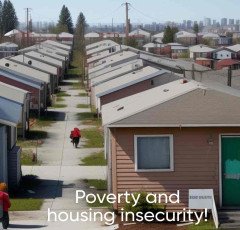
Poverty and housing insecurity

The term "poverty" describes the condition of being exceedingly poor, struggling to satisfy one's fundamental requirements, and missing basic essentials including food, housing, and clothing.
Access to education, economic prospects, healthcare, and social support are just a few of the many factors that have an impact on poverty, which is a complicated and diverse problem.
On the other hand, a lack of a stable and secure place to dwell is referred to as housing insecurity. It can show up in a number of different forms, such as poor housing, unstable housing conditions, or homelessness. Numerous reasons, such as poverty, job loss, eviction, domestic violence, and mental health problems, can lead to housing instability.
Housing insecurity and poverty are frequently associated, with poverty serving as a major contributing factor.
People who are poor could find it difficult to pay for basic essentials like food and medical care, leaving little or no money for housing. They might consequently have to live in subpar accommodation, in overcrowding, or perhaps end up homeless. In contrast, housing instability can hinder access to social services, work opportunities, and education, making it more difficult for people and families to escape poverty.
A person's physical and mental health can be significantly impacted by their housing situation, and individuals who are suffering housing insecurity are more likely to develop chronic health conditions including respiratory and cardiovascular disease as well as mental health disorders like anxiety and depression.
Children who face housing insecurity are more likely to struggle in school, have poor health outcomes, and experience trauma. Housing insecurity can have a negative impact on children as well.
A multimodal strategy that incorporates laws and initiatives aiming at expanding economic opportunity, enhancing access to affordable housing, and decreasing poverty is needed to address poverty and housing insecurity. This can involve actions like increasing the minimum wage, giving affordable housing subsidies, funding education and training programs, and enhancing accessibility to social and medical services.
The different needs and circumstances of persons who experience housing insecurity, including those who are homeless, residing in poor housing, or at risk of eviction, must be taken into account in order to address housing insecurity. This may involve measures like temporary housing, rental assistance programs, and legal assistance for residents facing eviction.
Tackling housing insecurity necessitates addressing structural problems including discrimination, a lack of accessible credit, and zoning laws that restrict the availability of affordable homes in particular locations. It is crucial to understand that combating poverty and housing insecurity calls for a consistent effort over the long term.
In order to address poverty and housing insecurity, social and cultural transformation are necessary in addition to policy and programmatic efforts. This can involve raising public knowledge of the underlying causes and effects of poverty and housing insecurity, encouraging compassion and understanding for those dealing with these problems, and promoting participation and support from the community for those in need.
Due to their complexity and connections, homelessness and poverty must be addressed from many different angles.
We can endeavor to create a more just and equitable society where everyone has access to the needs of life by tackling the underlying causes of poverty and investing in accessible housing options and social services.
It is also important to remember that poverty and housing insecurity are not specific to any one region or nation, necessitating a global effort to combat them. Conflict, displacement, and natural catastrophes worsen poverty and housing insecurity in many regions of the world, and resolving these problems calls for a concerted international effort.
Because the COVID-19 epidemic disproportionately affected low-income neighborhoods and increased homelessness and housing insecurity, it has brought attention to the critical need to address poverty and housing instability. The pandemic has highlighted the need for long-term solutions that address the underlying causes of poverty and housing insecurity. It has also exposed systemic injustices and vulnerabilities within our society.
A multimodal strategy that incorporates policy and programmatic interventions, social and cultural change, and a worldwide effort to address systemic concerns is necessary to address the complex and interwoven issues of poverty and housing insecurity. Together, we can build a more just and equitable society where everyone has access to thriving conditions such as safe, stable, and cheap housing.
Must acknowledge that marginalized and disadvantaged communities, such as persons of color, immigrants, and those with disabilities, are disproportionately affected by poverty and housing instability. Therefore, tackling poverty and housing insecurity requires an intersectional strategy that takes into consideration the distinctive experiences and difficulties that various groups encounter.
To guarantee that people of color have equitable access to safe, stable, and affordable housing, it is crucial to address the racial wealth gap and institutional racism in housing regulations. To ensure that immigrant populations are not disproportionately impacted by housing insecurity, it is crucial to address their unique requirements, including language hurdles and lack of access to legal resources.
A dedication to sustainability and resilience is additionally necessary to alleviate poverty and housing instability.
It is crucial to invest in sustainable and resilient infrastructure and housing since environmental disasters and climate change can worsen poverty and housing insecurity, particularly in low-income populations.
A long-term, intersectional, and sustainable strategy that considers the various needs and situations of persons who are experiencing poverty and housing insecurity is needed to address these issues. We can build a more just and equitable society where everyone has the chance to live in safe, stable, and affordable housing by cooperating and investing in comprehensive solutions.
Recognizing that tackling poverty and housing insecurity is not only a moral but also an economic responsibility is crucial.
Significant economic costs can result from poverty and housing insecurity, including decreased productivity, higher healthcare expenditures, and slower economic growth.
As a result, funding for affordable housing and programs to end poverty can have a big positive impact on the economy in terms of greater employment, decreased healthcare expenses, and increased economic activity. Additionally, tackling poverty and housing insecurity can aid in promoting social cohesiveness and reducing social inequality, all of which are necessary for a healthy and prosperous society.
The different needs and circumstances of persons who are facing poverty and housing insecurity must be taken into account in order to effectively address poverty and housing insecurity. We can build a more just and equitable society where everyone has the chance to live in safe, stable, and cheap housing and to prosper by investing in affordable housing, programs to reduce poverty, and resilient infrastructure.
To underline that communities and individuals can both be extremely important in tackling poverty and housing insecurity.
This can involve working in soup kitchens or homeless shelters, making donations to charities that offer low-cost housing or assistance to people in need, and speaking out against local and federal policy changes.
By being aware of their own consumption patterns and making sustainable decisions that lessen the environmental impact of their lifestyles, individuals may also make a difference. We can build a more just and equitable society where everyone has access to the needs of life, including safe, stable, and cheap housing, by cooperating and taking collective action.
In order to combat poverty and housing instability, education is crucial. With the right education, abilities, and chances, people can achieve in life and find stable job and inexpensive housing, among other things.
We can contribute to ending the cycle of poverty and lowering the risk of housing insecurity by making investments in education and ensuring that everyone has access to chances for a quality education. This involves promoting early childhood education, making quality K–12 education accessible, and widening access to higher education and programs for vocational training.
A dedication to social justice and equity is additionally necessary to alleviate poverty and housing insecurity.
This entails addressing structural problems like racism, prejudice, and inequality in all of its manifestations. Additionally, it entails paying attention to and emphasizing the voices of individuals whose lives have been adversely affected by homelessness and poverty.
To making sure that everyone has access to the needs of life, such as secure, affordable housing, by working for a more just and equitable society. We can build a better future for everyone through teamwork, education, and a dedication to social justice.
Should acknowledge that housing instability and poverty are society problems that need for systemic reform and collective action, rather than merely personal problems. This entails changing the laws and customs, such as discriminatory housing laws, a lack of affordable housing options, and inadequate support for those living in poverty, that foster poverty and housing instability.
It also entails tackling the underlying causes of poverty and housing insecurity, such as income inequality, a lack of access to chances for education and employment, as well as systematic racism and discrimination. We can build a society where everyone has access to secure housing that is both affordable and safe, as well as the chance to prosper, by tackling these structural problems.
A continuous and group effort by people, communities, and governments is needed to address the complicated and varied issue of poverty and housing insecurity. We can build a more just and equitable society where everyone has access to secure, affordable housing by making educational investments, advancing social justice and equality, and tackling systemic problems.
Tackling poverty and housing insecurity necessitates a dedication to building a society that cherishes the welfare and dignity of every person.
This entails understanding how social, economic, and environmental problems are interconnected and working toward all-encompassing solutions that deal with the underlying causes of poverty and housing insecurity.
Assuring their participation in the decision-making process also entails elevating the opinions and experiences of individuals who have been directly impacted by poverty and housing insecurity.
We can build a society where everyone has access to secure, affordable housing and the chance to live a life of dignity and fulfillment by cooperating and taking collective action. The advantages are tremendous, but it is a long-term endeavor that calls for perseverance, dedication, and a commitment to justice and equity.















 Unlimited access to classes on illustration, photography, design, film, music
Unlimited access to classes on illustration, photography, design, film, music  ASPINAL LONDON
ASPINAL LONDON  Favorite Company (Cuelinks)
Favorite Company (Cuelinks)  Sennheiser
Sennheiser  SEO Checklist
SEO Checklist  Best Robotic Vacuum Cleaners
Best Robotic Vacuum Cleaners  Online Marketing
Online Marketing  Only For The United States
Only For The United States  Amazon Best Selling Products
Amazon Best Selling Products  NordVPN
NordVPN  BEST SELLER TOP10
BEST SELLER TOP10  SOFAS
SOFAS  Hello Theme
Hello Theme  TitTok Revolution
TitTok Revolution  1150+Trendy kids coloring pages Bundle
1150+Trendy kids coloring pages Bundle  NordPass
NordPass  Smart Doorbell
Smart Doorbell  Online Technology Classes
Online Technology Classes  Unreal Engine 5 For Beginners Learn The Basics Of Virtual Production
Unreal Engine 5 For Beginners Learn The Basics Of Virtual Production  Women Fashion
Women Fashion  The Click Engine
The Click Engine  Graphics & Design
Graphics & Design  Top Rated From Amazon
Top Rated From Amazon  Acer Laptop
Acer Laptop  ELECTRONIC ACCESSORIES
ELECTRONIC ACCESSORIES  NordLocker
NordLocker  Best Sellers On Amazon
Best Sellers On Amazon  Artificial Intelligence
Artificial Intelligence  Men Clothing
Men Clothing  The Secret Email System
The Secret Email System  ASUS Laptop
ASUS Laptop  Best Home Appliances
Best Home Appliances  Creative Brief For Video Shoot
Creative Brief For Video Shoot  Best Selling Books
Best Selling Books  One World Collection
One World Collection  Hot Bags For Pain Relief
Hot Bags For Pain Relief  RPM 3.0
RPM 3.0  All Wireless Products
All Wireless Products 
















